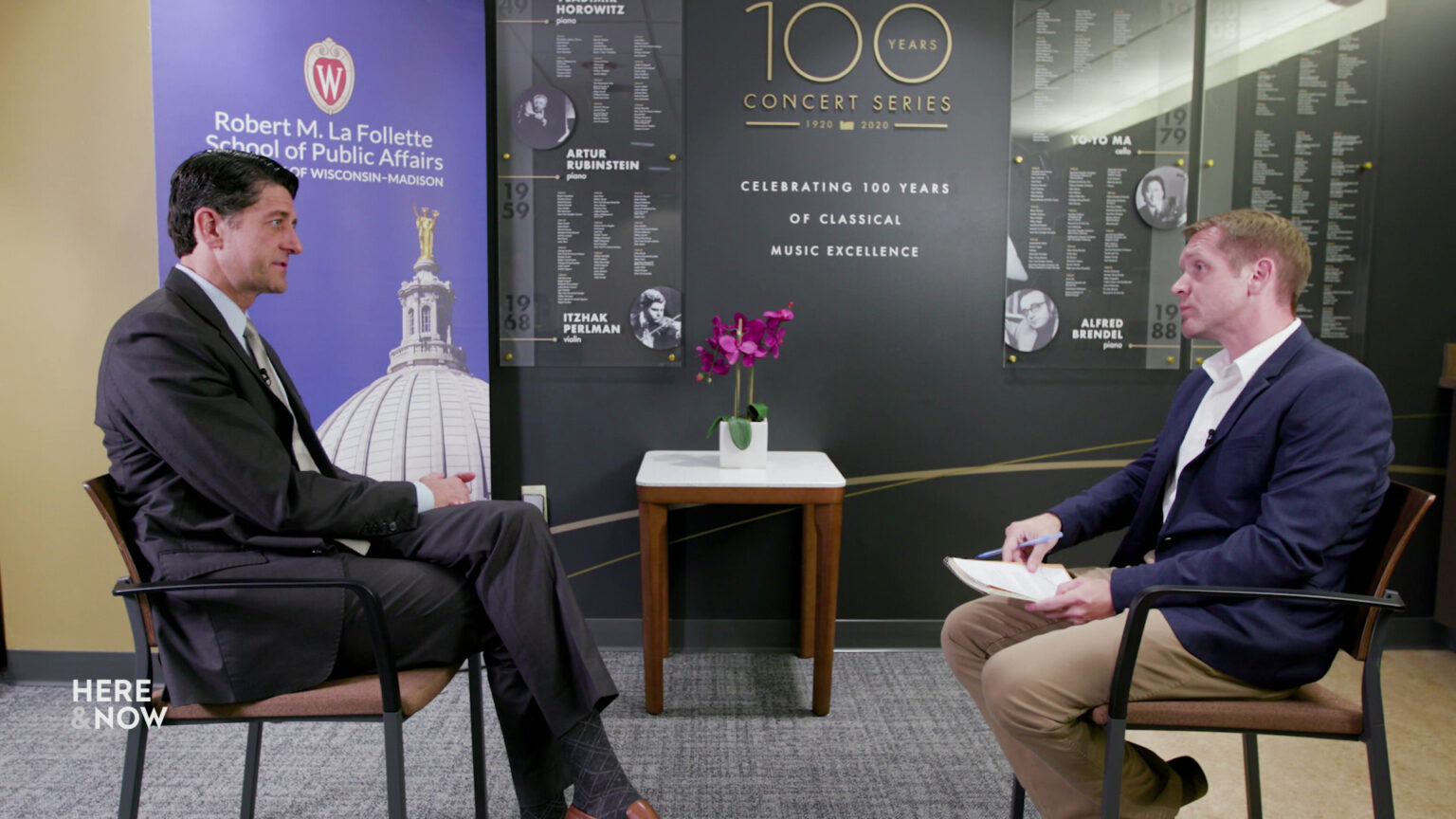'Here & Now' Highlights: Michael Rosen, Paul Ryan, Mayor Mitch Reynolds
Here's what guests on the September 29, 2023 episode said about the United Auto Workers strike, the direction of the Republican Party, and an idea to protect Mississippi River water resources.
By Frederica Freyberg | Here & Now
October 2, 2023

Former Speaker of the House Paul Ryan and Steven Potter (Credit: PBS Wisconsin)
Auto parts makers in Milwaukee and Hudson joined a UAW strike and staged rallies in both cities — a former Chrysler auto worker in Kenosha and retired economics professor, Michael Rosen compared union might of the past to today’s climate of declining wages and worker concessions. Former Speaker of the House and Republican vice presidential candidate Paul Ryan made his views on former President Donald Trump plain in an interview during a visit to the UW-Madison campus. As western U.S. states ponder pumping water from the Mississippi River, mayors from 30 cities in ten states in the river’s corridor voted to approve work on a compact to block such diversions — La Crosse Mayor Mitch Reynolds is leading the effort.
Michael Rosen
Retired economics professor, Milwaukee Area Technical College
- The United Auto Workers union is on strike against three of the country’s largest car and truck manufacturers. Auto parts workers in Wisconsin joined the walkout on Sept. 22. At issue for the union – the massive wage gap between CEOs and the companies’ workers. The median wage of union auto workers is about $80,000, including benefits, whereas the compensation package for the CEO of General Motors nears $30 million.
- Rosen: “In 1965, CEOs made 15 times as much as their workers. Today, it’s over 350 times. The auto companies have made a quarter of $1,000,000,000,000 over the last decade, and yet the auto workers have seen a decline in their wages — in real wages, spending power of 20%. Meanwhile, the CEOs are being paid $20 million a year, getting $20 million a year raises. And this is really the heart of the matter. The people who are creating the wealth for these auto companies have not been adequately compensated… They gave up cost benefit increases in the Great Recession. They have not gotten those.”
Paul Ryan
Former Speaker of the House
- Ryan stepped away from electoral politics in 2019, after having served as a U.S. Representative for Wisconsin’s 1st Congressional District since 1999, the last four of which as Speaker of the House. A longtime leader in Republican politics, Ryan was the party’s vice presidential candidate in 2012. A policymaker in residence at the UW-Madison La Follette School of Public Affairs in the fall of 2023, Ryan did not mince words when asked his view on whether Republicans will take back the White House in 2024.
- Ryan: “If we beat Trump in the primary, we’ll win. If we nominate Trump, I think we’ll lose. I think it’s just that simple… There are two reasons I don’t support Trump. One practical, one sort of principle. The practical reason is, ever since his one win in 2016, we’ve been losing ever since. The principal reason why I don’t think he should be our nominee is I don’t think he’s fit to be president. I think he proved it to all of us on January 6th.I don’t think he’s capable of being a good president.”
Mayor Mitch Reynolds
Mayor, City of La Crosse
- An idea for a Mississippi River Compact is modeled after the Great Lakes Compact now in place. This effort to prevent western states from siphoning off water from the river takes on special urgency with waterways like the Colorado River experiencing declines due to irrigation use by farmers and ranchers in arid regions. Reynolds said it wouldn’t be outlandish to imagine an engineering feat of building pipes and pumps to divert water from the Mississippi River to western states – hence the need for a compact to protect the drinking water of about 20 million people in dozens of cities.
- Reynolds: “It is the lifeblood of the United States of America, the most important basin in the world in some ways. (It serves) one out of 12 people… So we have to maintain the Mississippi River. It is not only something that’s beneficial for our communities up and down the Mississippi River, but also for our entire nation. When you think about the number of states that the basin drains, it’s 32 states that the basin drains, and 40% of the ag products in the nation will travel down the Mississippi River. And so for us to create a compact is really just a sensible way to ensure that the Mississippi River is still in use as a significant water resource, a natural habitat resource and navigation resource, an economic resource for generations to come.”
Watch new episodes of Here & Now at 7:30 p.m. on Fridays.
 Passport
Passport











Follow Us